CFMoto 650GT, 650MT review, test ride
These are Chinese company CFMoto’s most premium products for India. We set out to tell you what to expect.
Published on Oct 09, 2019 06:00:00 AM
27,557 Views
Follow us on


MT’s elaborate crash guard adds around 7kg more to the 213kg kerb weight

The GT is a large motorcycle, but the proportions are just right.
We live in a day and age where information is just a Google search away. So, I’m not going to bore you with a long history lesson about CFMoto, the latest company to enter the premium two-wheeler market in India. What I will tell you, however, is that this Chinese giant has been selling its premium motorcycles in countries across Europe and Australia, and over time, it has gained quite a reputation for decent quality at a competitive price.
Out of the four CFMoto motorcycles – 300NK, 650NK, 650MT and 650GT – that were recently launched in our country, the GT and MT are the flagships and represent the best of what the company has to offer. So we elected to ride the two in an attempt to discover what this brand is all about. And we begin by the way they look.
Doing it in style
At the expense of contradicting myself, I have to open the history books to tell you that CFMoto is the official partner of KTM AG in China and has been assembling the 200 Duke and 390 Duke for the Austrian manufacturer. The advantage for CFMoto in this partnership is that it opened the doors to the Austrian design firm, Kiska. It’s renowned for designing the aggressive looking KTMs – like the Duke family, for example – and I have to say that they’ve done an equally good job with the 650MT.
As an adventure tourer, the 650MT certainly looks the part. The tall stance, large fuel tank and neatly integrated body panels make the MT appear quite imposing, the elaborate crash bars notwithstanding. My favourite bit about the design is the shape of its half-fairing that houses the vertically stacked LED headlamps and a substantial, height-adjustable (albeit in quite a finicky manner) windscreen above it. A set of smoked turn indicators are neatly integrated under it and it’s these little elements that make the MT’s face appear distinct.

Speaking of which, the 650GT also looks unlike any other middleweight sports tourer. What catches your eye instantly are the large LED headlamps split by an L-shaped DRL. The overlapping panels that form the large fairing will have you almost mistaking the GT for a litre-class machine. Interestingly, and in complete contrast to the front end, the tail section is slim, with minimal body panels, liberating space for mounting panniers. To me, it’s the GT that has the more well-rounded design of the two and, personally, is the one that appeals to me; but they’re both good-looking machines.
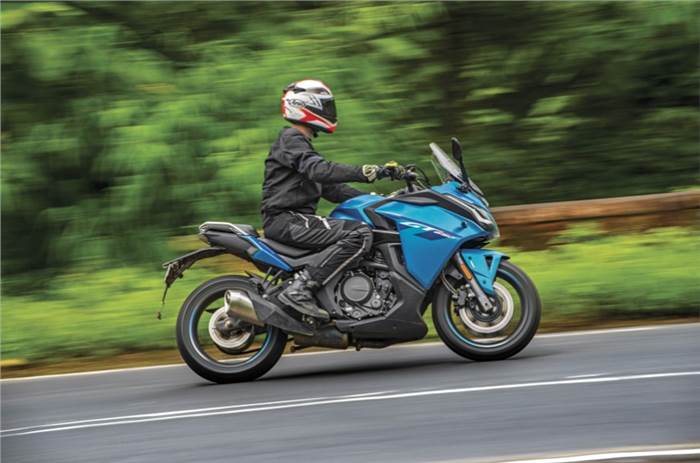
As purposeful designs, both motorcycles look ready for long-distance touring and what will help you stay comfortable during such a trip are the relaxed ergonomics. The handlebars on the GT and MT are wide and set high while the foot pegs aren’t too rear-set, resulting in an almost upright riding position. The GT is slightly more sporty, but its low 795mm seat height also makes it far more accessible than the MT’s 840mm perch. That said, the MT’s seat is narrow and deeply scooped, which makes it easier to place your feet down than the spec sheet number would have you expect.
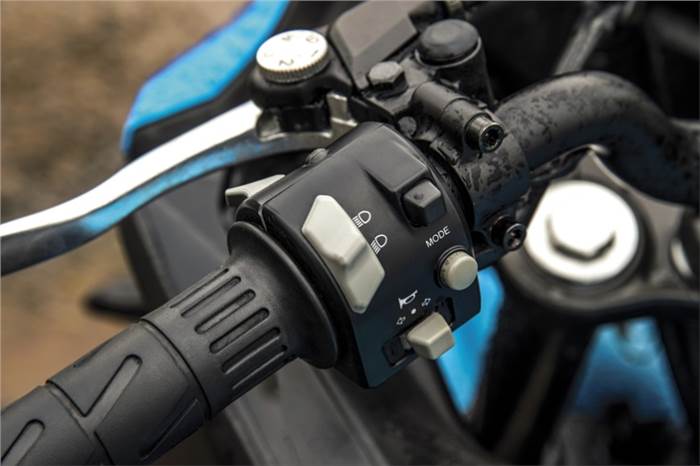
These motorcycles are put together decently and some components like the handlebars, body panels and paint finish are quite nice. At the same time, some things stick out, like the poor quality and downright flimsy switchgear on the more expensive 650GT. They lack that solid, premium feel that you’d expect from a motorcycle at this price point. Also, the silver finish around the MT’s LCD instrument cluster had begun to fade, exposing the black plastic underneath.
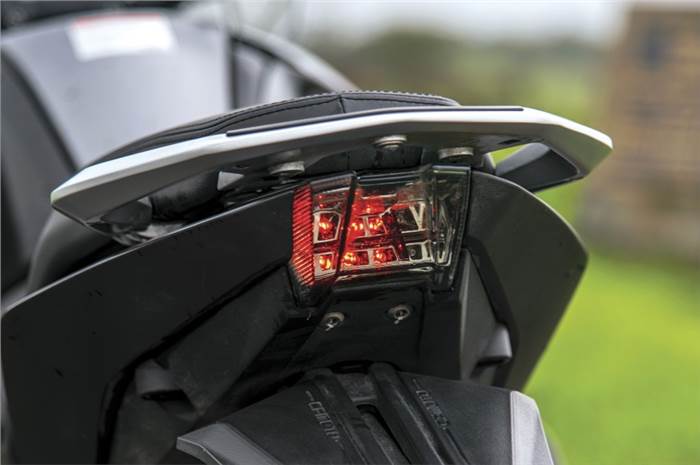
The bigger issue we discovered was when riding in the rain over a long period. Continuous exposure to moisture seemed to affect the electrics on both bikes, with the MT’s horn working intermittently and a couple of LEDs on its tail-lamp cluster not lighting up for some time. In case of the GT, the right-turn indicators insisted on turning on without any input and stayed that way until the sun came out and evaporated the moisture. It may be a case of faulty weather-proofing or a glitch with the first batch of these bikes. Thankfully, the powertrains prove to be much more impressive.
Go to match the show
The GT and the MT are both powered by the same, 649.3cc, inline-twin, liquid-cooled engine, albeit in different states of tune. While the 650GT’s unit produces 62hp and 58.5Nm of torque, the one in the MT makes significantly more power, at 71hp and 62Nm. This may lead you to believe that the GT is slower than the MT, especially considering its higher kerb weight, but our tests revealed a completely different picture.

The GT is quicker than the MT in the run up to 80kph, after which the MT begins to pull ahead and beat it to the 100kph mark, only by 0.08sec! As you can see, there’s almost nothing separating the two when it comes to outright performance, but when you consider in-gear acceleration, the MT is slightly quicker than the GT.
But numbers are just one side of the story. It’s the engine’s eager nature and wide spread of torque that delighted me at all times. The motor also feels unstressed at highway speeds, making both motorcycles capable of running for long hours without breaking a sweat.
What we haven’t told you yet is just how familiar these engines feel. Everything, from the power delivery to the sound, and even the level of vibrations at higher revs, all feels remarkably similar to Kawasaki’s venerable 650cc parallel-twin motor. A closer look at the spec sheet reveals this engine shares exactly the same bore and stroke; even the DOHC, eight-valve liquid-cooling layout is the same. The external engine casings are very familiar too, aside from some exterior design detailing. CFMoto tells us that this engine is a complete in-house effort, so we can only assume it was very closely benchmarked to one motor in particular when it was first developed.
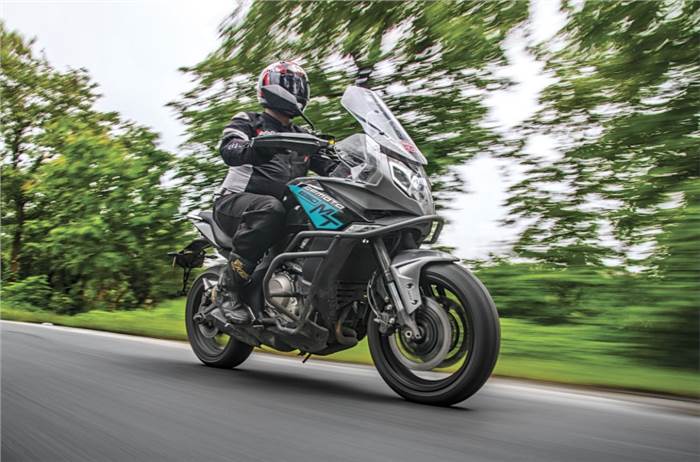
That’s no bad engine to try to replicate, but I wish the CFMoto’s engine was as adept at managing city traffic. During our time with the GT and MT, we dreaded riding in rush hour traffic because the engine’s cooling systems simply couldn’t cope with the heat.
During one such encounter with choc-a-bloc traffic, the coolant temperature readout on the 650MT showed a shocking 129deg C, while blowing a steady stream of hot air on my legs. Interestingly, CFMoto has added a line to the warning sticker on the fuel tank, asking riders not to keep the engine idling for a prolonged period of time. Clearly, they haven’t been on the average big city commute in India!
The GT is much better at managing the engine heat that reaches the rider’s legs, thanks to its fairing. However, it too runs worryingly hot in stop-go traffic and Rishaad could hear the coolant boiling after a typical 50-min evening rush hour commute.
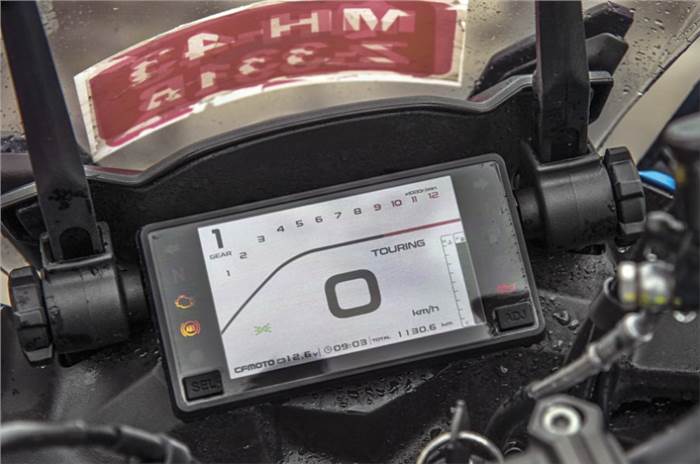
By now, you must have noticed that I haven’t mentioned anything about the two ride modes on the GT and MT – Touring and Sport. That’s because switching between the two doesn’t seem to alter anything aside from the layout on the GT’s swanky TFT display (the MT’s LCD display remains the same in both modes). We spoke with CFMoto to understand what exactly these modes are supposed to do, but we haven’t received a clear answer yet.
Same wine, different bottles
While the GT and MT are styled differently, they share the same tubular steel, diamond frame underneath, although the subframes and swingarms are different. But, in keeping with the intent of each motorcycle, they use different suspension components. Surprisingly, it’s the lower-priced 650MT that has the advanced suspension of the two. At the front, there’s a 43mm USD fork (made by Chinese firm Yuan) with 140mm travel and a monoshock at the rear. Both ends are adjustable for compression damping, whereas the monoshock has preload adjustment as well. In comparison, the GT has a conventional KYB front fork and preload adjustable monoshock.
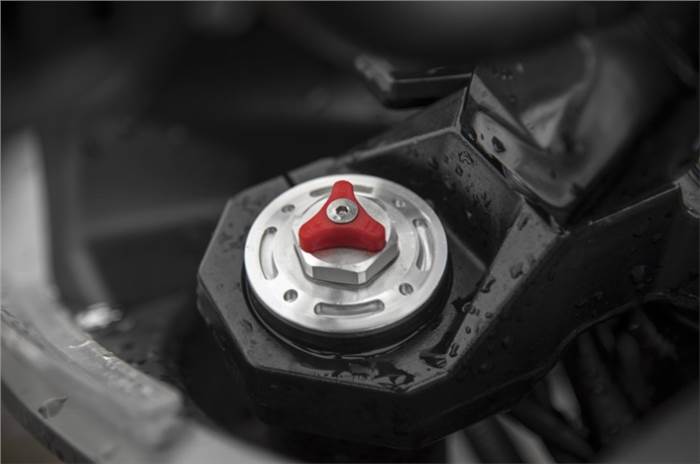
At low speeds, the suspension on both bikes did a good job of soaking up bumps and undulations, with the GT’s softer suspension offering a plush ride. Over a series of deep potholes, however, the difference in ride quality grows considerably. Where the GT remained relatively poised, the MT’s firmer suspension protested by sending jolts up my spine.
Through a set of corners, the MT feels sure-footed, aided by the sticky Metzeler Roadtec tyres. But the GT is quicker to turn in and feels sportier than its sibling, and we really liked the Chinese CST Adreno tyres too. The suspension setup is quite soft at the rear so there is a tendency for the bike to pogo if it encounters mid-corner undulations. Nevertheless, both bikes are competent handlers, but neither is sensational, and their considerable weight is something that’s never fully out of the picture. Considering how quickly the GT and MT get past legal highway speeds (150kph flies by very quickly), I was disappointed by the performance of the J.Juan brakes. While there’s bite and progression, they just don’t have enough power to slow down these big, heavy machines from high speeds and need a hard pull for serious performance. And that keeps you from going all out on them.
Time to choose
The CFMoto 650GT and 650MT are good-looking, decently built touring machines. The introductory pricing on the MT is quite competitive, at Rs 4.99 lakh, which is a whole Rs 1.7 lakh less than the directly comparable Kawasaki Versys 650. The GT on the other hand isn’t quite as lucrative a deal and its Rs 5.49 lakh price tag is only Rs 44,000 off the Kawasaki Ninja 650.
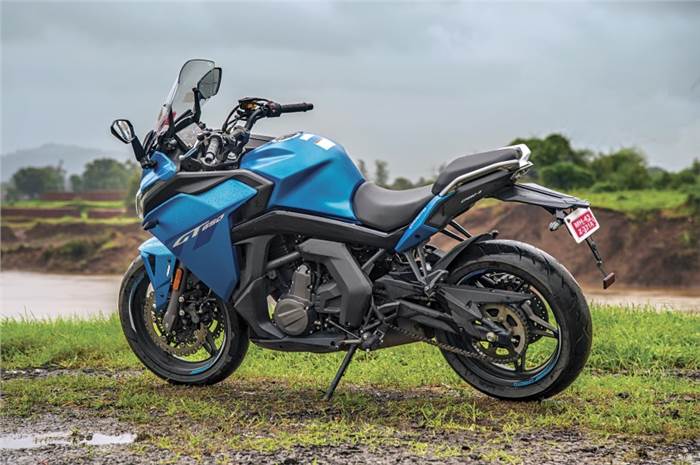
The MT’s additional ground clearance (170mm) will appeal to those who are looking for real-world practicality, while the GT is more for those who want to stick to the tarmac and cover distances at a quick pace.
While the heat and minor quality issues need to be addressed, the rest of the package seems quite competent for the price. That said, it’s too early to comment on reliability, but to us, the bigger question at the moment is how well CFMoto manages to deliver a premium sales and service experience in India. That’s something only time will tell.
| Specifications | ||
|---|---|---|
| CFMoto 650GT | CFMoto 650MT | |
| Engine | 649.3cc, inline-twin, liquid-cooled | 649.3cc, inline-twin, liquid-cooled |
| Power | 62hp at 9,000rpm | 71hp at 8,750rpm |
| Torque | 58.5Nm at 7,000rpm | 62Nm at 7,000rpm |
| Gearbox | 6-speed | 6-speed |
| Kerb weight | 226kg | 213kg |
| Wheelbase | 1,415mm | 1,415mm |
| Ground clearance | 150mm | 170mm |
| Seat height | 795mm | 840mm |
| Fuel tank | 19 litres | 18 litres |
| Suspension (f/r) | Telescopic fork/ monoshock | USD fork/ monoshock |
| Brakes (f/r) | 300mm twin discs, 240mm disc | 300mm twin discs, 240mm disc |
| Tyres (f/r) | 120/ 70 R17 / 160/60 R17 | 120/70 R17 / 160/60 R17 |
| Performance | ||
|---|---|---|
| CFMoto 650GT | CFMoto 650MT | |
| 20-50kph in 2nd | 2.44 | 2.20 |
| 30-70kph in 3rd | 4.13 | 3.62 |
| 50-80kph in 4th | 3.97 | 3.50 |
| 0-60kph | 2.41 | 2.42 |
| 0-100kph | 5.02 | 4.94 |
| 60-0kph (distance) | 16.98m | 16.16m |
| Price | ||
|---|---|---|
| CFMoto 650GT | CFMoto 650MT | |
| Price (ex-showroom, India) | Rs 5.49 lakh | Rs 4.99 lakh |
Copyright (c) Autocar India. All rights reserved.





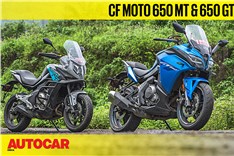
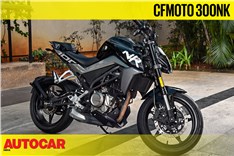

Comments
Member Login
Personal Details
No comments yet. Be the first to comment.